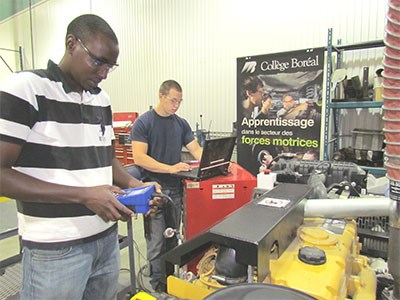Sudbury’s Symboticware is teaming up with Collège Boréal on an applied research project that provides the company with much needed analysis of its equipment, while giving students practical experience related to the mining industry.
The project continues a partnership started in 2010 when Symboticware was trying to ready for market its signature product, which collects data in real time to monitor use in association with maintenance, productivity, safety, emissions and more.
Now students in the school’s heavy equipment mechanic program are testing the company’s SymBot on various engine types at its lab in Sudbury. Historically, the SymBot has been adapted to work on Caterpillar equipment, but the company wanted more exposure to D-Deck and Toyota engines, said Kirk Petroski, Symboticware’s president and CEO.
“This was a very controlled environment,” Petroski said. “Typically, when you go underground or in a mining environment, it’s very difficult to do initial troubleshooting and diagnostics to figure out what data is available off of the engine, so this gave us a very good environment to do that.”
Testing done on equipment underground is subject to vehicle availability, which poses a challenge to the company. With an emphasis on production and revenue, it’s difficult to take a vehicle out of production even for a short time to outfit it with the SymBot and do the kind of analysis needed, he said.
“Having it ready to go so that it’s as plug-and-play as possible when we go bring it to market is to our benefit,” Petroski said. “We minimize our installation times by making sure that we have all our manuals, documentation, and we know exactly what data parameters are going to be available, so we do all this leg work up front.”
Petroski believes it’s equally important to provide hands-on experience to the students, who become familiar with the products and technology and could one day be working in the industry.
In a time when the mining industry has taken a dip, larger companies are not only laying people off but also not hiring students. Even though Symboticware is a small company, Petroski said welcoming students to work for him is an important part of building community and fostering new technology for the industry.
“I think, it’s very important that, even though things have declined somewhat in mining, we involve ourselves with different community partners, that we help each other along in these times, we make sure that there are still opportunities for these students and give them exposure to some technology,” Petroski said.
Funding he accessed through the Colleges Ontario Network for Industry Innovation (CONII), helped pay for having the students work for him.
Brian Vailllancourt, dean of trades and applied technologies at Boréal, agreed this type of practical experience is invaluable to the students.
“The hands-on experience for our students is second to none,” he said. “Often in applied research projects, the subject matter will allow students to apply the knowledge they’ve learned in their programs, but applied research also pushes them further as far as cutting edge technology in their field of study, so it’s great in that aspect.”
The benefit of networking opportunities for students and staff can’t be overlooked, he said, but it also gives industry an opportunity to see what’s happening at the school.
“This is a great opportunity for industry to understand what’s going on in the college, terrific opportunities for our students to get hands-on with industry, understand how industry works, the opportunities in industry, and sometimes these opportunities end up being extended job interviews for our students,” he said.
This is one of the first applied research projects undertaken by Boréal, but Vaillancourt sees expanded opportunities for similar projects in the future.
Petroski encourages mining companies with excess equipment to donate it to the school so that students can continue to have equipment to work on. There are invaluable teaching benefits to participating in the program, and students could be working for them one day.
“They love to get their hands very involved with wiring, the harnesses, the technology as much as possible,” he said. “So I definitely think they have a valuable learning experience from it.” www.symboticware.com




